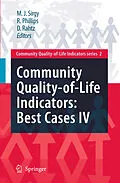This book contains "best practices" of community quality-of-life indicator systems implemented in various communities throughout the world.
The cases in this volume describe communities that have launched their own community indicators programs. Elements that are included in the descriptions are the history of the community indicators work within the target region, the planning of community indicators, the actual indicators that were selected, the data collection process, the reporting of the results, and the use of the indicators to guide community development decisions and public policy.
Autorentext
M. JOSEPH (JOE) SIRGY is a social/consumer/organizational psychologist (Ph.D., U/Massachusetts, 1979), Professor of Marketing, and Virginia Real Estate Research Fellow at Virginia Polytechnic Institute and State University (Virginia Tech). He has published extensively in the areas of consumer behavior, marketing communications, business ethics, and quality of life.
He has published extensively in social/behavioral science, managerial, and systems related journals. Examples include Social Indicators Research, Journal of Business Ethics, Journal of Applied Social Psychology, Journal of Social Behavior and Personality, Behavioral Science, American Journal of Economics and Sociology, Systems Research, Journal of Consumer Research, Journal of Marketing Research, Journal of the Academy of Marketing Science, European Journal of Marketing, Journal of Business Research, Journal of Macromarketing, Journal of Advertising, Current Issues and Research in Advertising, Psychology and Marketing, Journal of Public Policy and Marketing, Journal of Personal Selling and Sales Management, Journal of Consumer Satisfaction/Dissatisfaction and Complaining Behavior, Journal of Travel Research, Journal of Tourism and Travel Marketing, Research in Marketing, Journal of Business and Psychology, Academy of Marketing Studies Journal, International Journal of Management, Journal of Housing and Built-in Environment, Applied Research in Quality of Life, and Journal of Happiness Studies.
He is the author/editor of numerous books including: SOCIAL COGNITION AND CONSUMER BEHAVIOR (New York: Praeger Publishers, 1983); MARKETING AS SOCIAL BEHAVIOR (New York: Prager Publshers, 1984); SELF-CONGRUITY (New York: Praeger Publishers, 1986); NEW DIMENSIONS OF QUALITY-OF-LIFE/MARKETING RESEARCH (Bridgeport, CT: Greenwood Press, 1995); CONSUMER BEHAVIOR (Lincolnwood, IL: NTC Books, 1997); INTEGRATED MARKETING COMMUNICATIONS: A SYSTEMS APPROACH (Englewood Cliffs, NJ: Prentice-Hall Publishers); HANDBOOK OF QUALITY-OF-LIFE RESEARCH: AN ETHICAL MARKETING PERSPECTIVE (Dordecht, The Netherlands: Kluwer Academic Publishers, 2001); THE PSYCHOLOGY OF QUALITY OF LIFE (Dordecht, The Netherlands: Kluwer Academic Publishers, 2002); SHOPPER, BUYER, AND CONSUMER BEHAVIOR (Cincinatti, OH: Atomicdog Publishing, 2002); ADVANCES IN QUALITY-OF-LIFE THEORY AND RESEARCH (Dordecht, The Netherlands: Kluwer Academic Publishers, 2003); COMMUNITY QUALITY-OF-LIFE INDICATORS: BEST CASES (Dordecht, The Netherlands: Kluwer Academic Publishers, 2004); WELL-BEING MARKETING: THEORY, RESEARCH, AND APPLICATIONS )Soeul, Korea: Pakyoungsa Publishing, 2005); SHOPPER, BUYER, AND CONSUMER BEHAVIOR, 3RD EDITION (Cincinatti, OH: Atomicdog Publishing, 2006); STRATEGIC MARKETING COMMUNICATIONS: A SYSTEMS APPROACH TO IMC (Cincinnati, OH: Atomicdog Publishing/Thomson, 2006); COMMUNITY QUALITY-OF-LIFE INDICATORS: BEST CASES II (Dordecht, The Netherlands: Springer Publishers, 2006), and COMMUNITY QUALITY-OF-LIFE INDICATORS: BEST PRACTICES III (Blacksburg, VA: ISQOLS, 2007).
He presently serves as an editor of the Quality-of-Life/Marketing section of the Journal of Macromarketing and co-editor-in-chief of Applied Research in Quality of Life. He co-founded the International Society for Quality-of-Life Studies in 1995 and is currently serving as its Executive Director. He was also the president of the Academy of Marketing Science (2002-03).
In 1992, he received the Distinguished Fellow recognition from the Academy. In 1997, he received the Distinguished Fellow recognition from the International Society for Quality-of-Life Studies. In a recent survey of scholarly productivity in business ethics, he was ranked as 82nd among 2,371 business ethics scholars world-wide. In 2003, the board of directors of the International Society for Quality-of-Life Studies elected him to receive the highest distinction of the society, namely the Distinguished Quality-of-Life Researcher Award. This is a lifetime award given every 1 and a half years to quality-of-life researchers who achieved excellence and scholarly distinction in quality-of-life research. In 2007, the Academy of Marketing Science has given him the Harold Berkman Service Award for life-time achievement in service of the Academy and the marketing professoriate worldwide.
Rhonda Phillips, Ph.D, AICP, CEcD
Community investment and well-being comprise the focus of Rhonda's research and outreach activities. With public, private and non-profit experience, she offers both practice and academic perspectives. As a professor in the School of Community Resources & Development (http://scrd.asu.edu) at Arizona State University, Rhonda works with faculty, staff, students and organizations to expand the reach of community-based education and research initiatives for enhancing quality of life. Her ...
Zusammenfassung
Community indicators projects are plentiful. These projects capture the quality of life in towns, cities, counties, metropolitan regions, and larger geographic regions. Community quality-of-life (QOL) indicators are increasingly being integrated into overallplanningandotherpublicpolicyactivities.Thecommunityindicatorsproject reports are used not only in monitoring and evaluation applications but also in the context of increasing citizen participation in guiding communities towards achieving desired goals. This is the fourth book in a series covering best practices in community QOL indicators. Each volume presents individual cases (chapters) of communities at the local or regional levels that have designed and implemented community indi- tors programs. In Volume IV, we present nine chapters from a variety of contexts: cities such as the City of Phoenix (Arizona, USA), Jacksonville (Florida, USA), and Bristol (UK), suburban communities areas such as Long Island (New York, USA) and Sydney (Australia), larger regions such as Vancouver (Canada), and townships such as Sobantu (South Africa).
Inhalt
Improving the Quality of Life in a City of Phoenix, Arizona Neighborhood Through Collaborative Investment.- The Long Island Index.- Lessons from a Community-Based Process in Regional Sustainability Indicator Selection: The Case of the Regional Vancouver Urban Observatory.- Mental Health Indicator Parity: Integrating National, State, and Local Data.- The Importance of Local Information: Quality of Life Indicators in Bristol.- Understanding the Political Significance of Community Sustainable Development Indicators in Post-Apartheid South Africa: A Case Study from Sobantu Township, Pietermaritzburg.- Jacksonville's Race Relations Progress Report: Creating Change through Community Indicators.- Gender Equality and Quality of Life: Examples of Best Practices from Nine.- Quality of Life Through Innovation Indicators: The Case of Peripheral Suburbs of Sydney.
